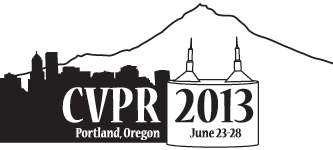-
Video Enhancement of People Wearing Polarized Glasses: Darkening Reversal and Reflection Reduction
AbstractWith the wide-spread of consumer 3D-TV technology, stereoscopic videoconferencing systems are emerging. However, the special glasses participants wear to see 3D can create distracting images. This paper presents a computational framework to reduce undesirable artifacts in the eye regions caused by these 3D glasses. More specifically, we add polarized filters to the stereo camera so that partial images of reflection can be captured. A novel Bayesian model is then developed to describe the imaging process of the eye regions including darkening and reflection, and infer the eye regions based on Classification ExpectationMaximization (EM). The recovered eye regions under the glasses are brighter and with little reflections, leading to a more nature videoconferencing experience. Qualitative evaluations and user studies are conducted to demonstrate the substantial improvement our approach can achieve.
Related Material
[pdf][bibtex]@InProceedings{Ye_2013_CVPR,
author = {Ye, Mao and Zhang, Cha and Yang, Ruigang},
title = {Video Enhancement of People Wearing Polarized Glasses: Darkening Reversal and Reflection Reduction},
booktitle = {Proceedings of the IEEE Conference on Computer Vision and Pattern Recognition (CVPR)},
month = {June},
year = {2013}
}
These CVPR 2013 papers are the Open Access versions, provided by the Computer Vision Foundation.
Except for the watermark, they are identical to the accepted versions; the final published version of the proceedings is available on IEEE Xplore.
Except for the watermark, they are identical to the accepted versions; the final published version of the proceedings is available on IEEE Xplore.
This material is presented to ensure timely dissemination of scholarly and technical work.
Copyright and all rights therein are retained by authors or by other copyright holders.
All persons copying this information are expected to adhere to the terms and constraints invoked by each author's copyright.

